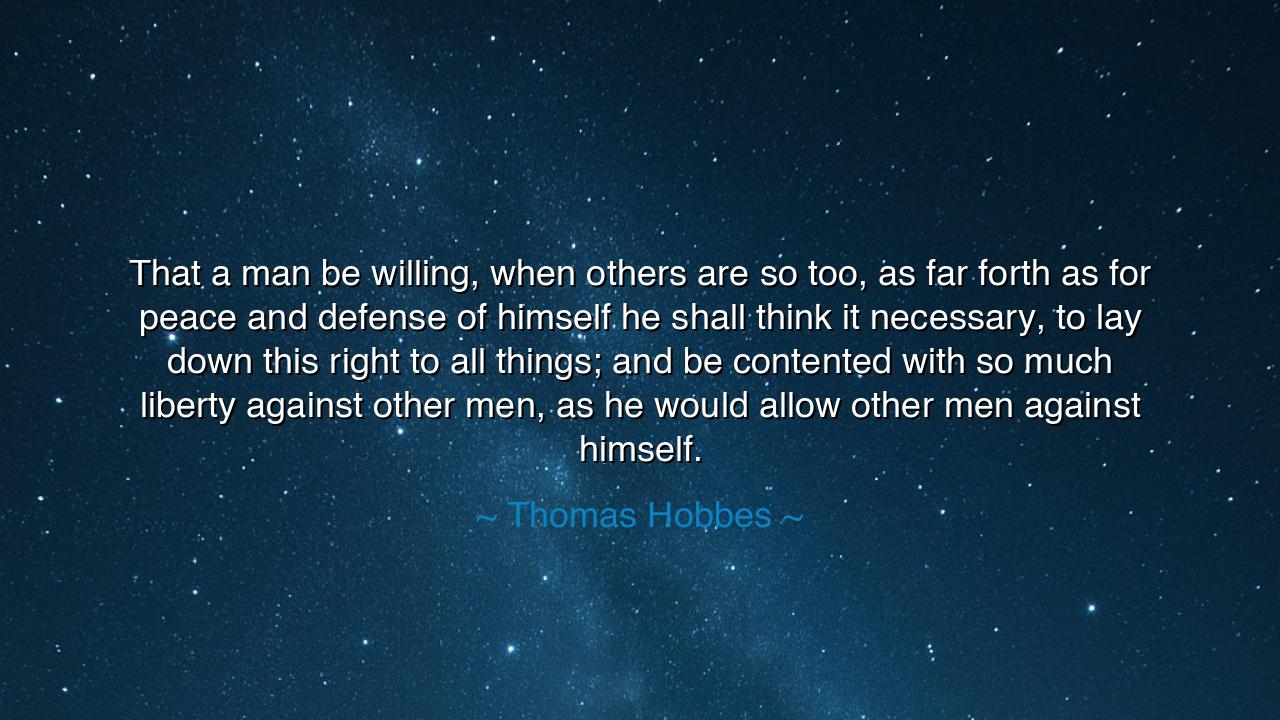
That a man be willing, when others are so too, as far forth as
That a man be willing, when others are so too, as far forth as for peace and defense of himself he shall think it necessary, to lay down this right to all things; and be contented with so much liberty against other men, as he would allow other men against himself.






Hear the words of the philosopher Thomas Hobbes, who gazed upon the storms of human strife and sought to bring forth order from chaos: “That a man be willing, when others are so too, as far forth as for peace and defense of himself he shall think it necessary, to lay down this right to all things; and be contented with so much liberty against other men, as he would allow other men against himself.” In this saying, drawn from the heart of Leviathan, Hobbes reveals the covenant that must exist if men are to escape the cruelty of endless war. He calls us to understand that absolute freedom without restraint is but the freedom of wolves, and that true peace is found only when each is willing to limit himself so that all may live.
In this vision, Hobbes confronts the state of nature, that wild domain where every man clings to the right to all things, even to the body and life of his neighbor. There, without law or covenant, nothing is unjust, and all live in fear. It is the realm of suspicion, where every shadow may conceal an enemy, where life is solitary, poor, nasty, brutish, and short. From this bleak condition arises the necessity of agreement—that one man shall surrender some portion of his liberty, provided others do the same, so that peace may be born.
Consider the example of the founding of the American Constitution. After the long war for independence, the colonies, though victorious, were fractured. Each state clung fiercely to its own liberty, unwilling to bow to a central power. But chaos loomed—commerce faltered, disputes flared, rebellion simmered. It was only when men such as Madison and Hamilton persuaded their fellows to lay down certain rights into the hands of a greater union that true stability emerged. By accepting limits upon themselves, by granting the federal power to govern, they forged a covenant that ensured mutual defense and prosperity. They gave up a portion of liberty so that liberty itself might endure.
Hobbes’s wisdom resounds across the ages: liberty unrestrained becomes the seed of conflict, for if every man grasps all he can, none can trust, and none can be secure. Yet when liberty is measured and shared—when each is willing to allow no more against another than he would endure himself—then justice arises. It is not submission born of weakness, but covenant born of foresight, where men discover that strength lies not in domination, but in agreement.
The teaching is stern but clear: peace is never free. It demands that each surrender a measure of his boundless will. But this surrender is not loss—it is exchange. By giving up the terror of unchecked freedom, each gains the greater treasure of security, of community, of life that may flourish without constant dread. The hand that refrains from striking another is also spared the blow. The man who accepts bounds upon himself builds the walls within which his children may grow without fear.
And what then shall we learn for our own lives? Let each of us, in our dealings with others, remember the covenant Hobbes describes. Do not claim for yourself more liberty than you would gladly grant to your neighbor. If you demand respect, give respect. If you wish for safety, do not endanger others. If you long for peace, be the first to lay down the weapon of selfish will. For harmony in families, in communities, in nations, is born when each accepts limits not from compulsion, but from wisdom.
Practical action flows from this truth. When conflict arises, ask yourself: “Am I seeking more than I would allow another to take from me?” If so, restrain your hand. When tempted to exploit, recall that in doing so you invite exploitation in return. Build your life upon the balance Hobbes speaks of—granting and expecting the same measure of liberty—and you shall walk in a peace that force alone cannot buy. Thus the lesson of Hobbes becomes not only the foundation of states, but the rule of hearts: be content with fairness, and from fairness springs the covenant that preserves mankind.






AAdministratorAdministrator
Welcome, honored guests. Please leave a comment, we will respond soon